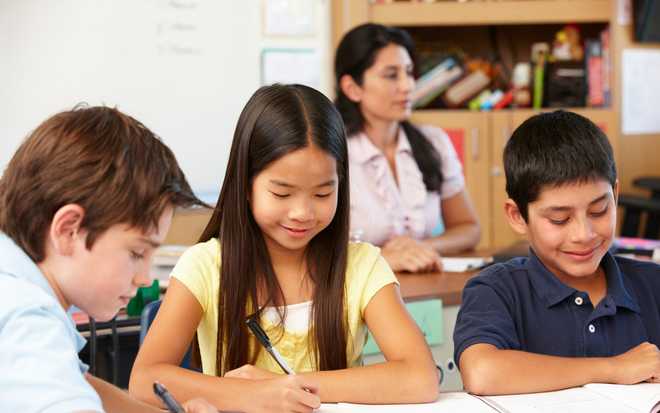Grade 3 Language Arts
Discover Grade 3 standards

Home > Language Arts > Grade 3
In third grade language arts, children are introduced to more complex concepts, such as organizing structured writing pieces, decoding multisyllable words, mastering new spelling patterns, and using more advanced grammar and punctuation rules.

Reading
Third graders develop into more fluent readers, displaying confidence, expression, and intonation when reading aloud. As their vocabulary expands, they rely less on pictures and illustrations for understanding and begin to explore a wider range of text types, including stories, poems, chapter books, and informational texts. This year marks a transition from 'learning to read' to 'reading to learn,' as children read more factual texts, identify the author’s purpose, and answer comprehension questions based on what they've read.
Children also focus on decoding multisyllable words and using context clues to determine the meaning of a word. They analyze word parts, such as compound words, and build their vocabulary by learning synonyms and antonyms. Students also gain a deeper understanding of figurative language, including similes, metaphors, and personification. These strategies help them improve their comprehension skills and interpret more complex texts with greater ease.
Spelling
In Grade 3, students build on their spelling knowledge from earlier grades, growing in confidence as they tackle more challenging spelling words. They focus on applying spelling patterns, learning word families, and understanding position-based spellings, while also identifying syllable patterns. New concepts like meaningful word parts—such as prefixes, suffixes, and root words—help them spell grade-level words with greater accuracy. Encouraging regular reading supports their spelling development by exposing them to new vocabulary, multiple-meaning words, and recurring spelling patterns.
Children are expected to apply various spelling techniques, such as recognizing silent consonants, mastering spelling patterns for vowel sounds, and breaking words into syllables to aid spelling. They also continue to work with phonics and different types of syllables, like closed, open, vowel-consonant-e (VCE), and r-controlled syllables, all of which help them decode and spell more complex words. Grade 3 also emphasizes position-based spellings, including the 'i before e except after c' rule, and the ability to handle words with diphthongs and vowel teams.
Children also begin practicing specific spelling rules, such as doubling consonants, dropping the final 'e,' and changing 'y' to 'i' before adding suffixes.
Grammar
Children in Grade 3 focus on developing more advanced grammar skills to improve their creative writing and express ideas clearly. They begin working with abstract nouns, such as 'friendship' and 'justice,' which help them describe feelings and concepts that cannot be physically touched. Mastering the use of simple verb tenses (past, present, and future) becomes a key focus, alongside ensuring correct subject-verb agreement, where singular and plural subjects match the verb forms they use. Additionally, students explore other important parts of speech, such as homophones, adverbs, and conjunctions, all of which contribute to more detailed and accurate writing.
Third graders are introduced to comparative and superlative adjectives and adverbs, allowing them to compare people, places, and actions (e.g., 'tall, taller, tallest'). They also expand their knowledge of sentence structures by practicing simple, compound, and complex sentences. Coordinating conjunctions (e.g., 'and,' 'but') are used to connect independent clauses, while subordinating conjunctions (e.g., 'although,' 'because') help children join dependent and independent clauses to add more depth to their writing. Understanding homophones also becomes important, as students learn to distinguish between words that sound the same but have different meanings.
Punctuation
In Grade 3, students build on their understanding of basic punctuation, including periods, question marks, exclamation marks, and commas. They also work on proper capitalization, ensuring that the first word in sentences and proper nouns are correctly capitalized. As they progress, they learn to apply punctuation rules more consistently and explore more advanced uses of punctuation, such as adding dialogue and plural possessive nouns in their writing. Dialogue introduces the use of quotation marks to indicate when characters speak, and students practice placing dialogue tags correctly with commas before or after the spoken words.
Children also work on correctly using apostrophes to show possession. They learn to add an apostrophe and an "s" for singular nouns (e.g., "Will’s hat") and to place the apostrophe after the "s" for plural possessive nouns (e.g., "the kids’ school"). This understanding of possessives and capitalization helps young learners communicate ownership and proper names clearly in their writing.
Writing
In Grade 3, students build upon their earlier writing skills and are expected to write more independently and for longer periods. They learn to create structured writing pieces that include an introduction, main body, and conclusion, while focusing on proper spelling, grammar, and sentence structure. Young learners also begin to apply literary devices, make inferences, and use technology to compose their writing, honing their ability to write for different audiences and purposes.
Grade 3 writing focuses on three main styles: informative, opinion, and narrative writing. In informative writing, children gather and organize facts on a specific topic, using clear definitions, linking words, and visual aids like diagrams to help convey their message. Opinion writing teaches them to express their viewpoint on a topic, supporting their argument with reasons and examples, while maintaining consistency and coherence throughout the piece. Narrative writing encourages them to develop detailed stories with descriptive language, figurative techniques, and a clear plot structure.
Throughout the year, young learners also focus on improving their writing skills through revision and practicing based on given prompts. By writing about past experiences, making inferences, and researching factual information, third graders develop stronger communication skills, becoming more proficient at organizing ideas and using descriptive details to enhance their writing.
How Night Zookeeper can help

Night Zookeeper is an award-winning language arts program that makes reading & writing fantastically fun for kids! The program features games, skill challenges, creative writing prompts, and engaging lesson series, as well as personalized feedback from qualified tutors on your child's writing.
Sign up today and enjoy a free 7-day trial—no commitment required!
Related articles


Make Reading & Writing Fantastically Fun!
- Award-winning reading & writing program for kids
- Improves spelling, grammar, punctuation & vocabulary
- Over 1,000 different learning games and activities



